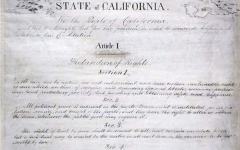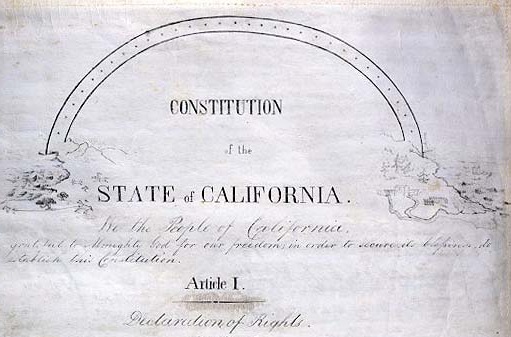
California State Capitol. (Photo: Kevin Sanders for California Globe)
Frequently Asked Questions about California Constitution Article V
Can the Governor require information to be reported?
By Chris Micheli, May 16, 2024 2:31 am
How many sections does Article 5 have? This article contains thirteen sections.
What does Article 5 relate to? It relates to the executive branch of state government.
Who is given the executive power of the state? Section 1 vests the executive power in the Governor who is required to faithfully execute the law.
What are the requirements for being Governor of California? Section 2 provides that the Governor is elected every four years at the same time that Assembly Members are and that he or she holds office beginning the Monday after January 1. The Governor must be a United States citizen and a resident of California for the past five years. The term of office is capped at two.
Is the Governor required to provide a state-of-the-state address? Section 3 requires the Governor to report to the Legislature each year on the condition of the State, usually referred to as the “State of the State” speech.
Can the Governor require information to be reported? Section 4 provides the Governor can require officers and agencies to furnish information related to their duties.
Who fills constitutional officer vacancies? Section 5 allows the Governor to fill a vacancy in office by appointment. This applies to other constitutional officers.
Is there a confirmation process for appointed officers? Section 5 specified that individual is confirmed by a majority vote of both the Assembly and Senate. That person shall complete the term of office for which he or she was appointed. If the person is not confirmed or refused confirmation by both houses within 90 days, then the individual takes office.
Can executive branch agencies be reorganized? Section 6 authorizes a statute to allow the Governor to reorganize functions among state agencies, other than the remaining constitutional offices, which are known as “Governor’s Reorganization Plans – GRPs”.
Who commands the state militia? Section 7 provides that the Governor is the commander in chief of the militia and may call upon it to execute the laws of the state.
Can a Governor pardon or commute criminal sentences? Section 8 provides the Governor authority to grant a reprieve, pardon and commutation, except for cases of impeachment. The Governor must report to the Legislature any grants and providing the facts and reasons for doing so.
Are there limitations on the Governor’s authority? Section 8 states that there cannot be any pardons for persons twice convicted of a felony, unless the Supreme Court recommends it.
Are the decisions of the state’s parole authority reviewable? Section 8 provides that the Governor may review decisions of the parole authority within 30 days of their recommendation. He or she may affirm, modify or reverse the decision based upon the same factors which the parole authority is required to consider. The Governor must report to the Legislature each parole decision he or she acts upon.
What is the role of the Lt. Governor? Section 9 requires the Lieutenant Governor to have the same qualifications as the Governor. The Lieutenant Governor is the President of the Senate, but may only cast a vote on a tie.
What is the succession plan to the governorship? Section 10 provides the Lieutenant Governor will become Governor when a vacancy occurs. He or she acts as Governor during an impeachment, when the Governor is out of state, or the Governor has a temporary disability. There is an order of precedence for succession to the Governor’s office or temporarily exercising the Governor’s functions. The Supreme Court has exclusive jurisdiction under this section to address any questions.
Are there term limits for the other constitutional officers? Section 11 provides that the Lieutenant Governor, Attorney General, Controller, Secretary of State, and Treasurer are elected at the same time as the Governor and are limited to 2 terms in office.
Who is in charge of law enforcement in California? Section 13 provides that the Attorney General is the chief law officer of the state and it is his or her duty to uniformly and adequately enforce the laws of the state.
Who oversees local law enforcement officials? Section 13 specifies that the Attorney General has direct supervision over every district attorney and sheriff in the state related to the duties of their offices and may require them to make reports on crimes.
Can the Attorney General choose to prosecute someone? Section 13 provides that, if the Attorney General opines that a law is not being adequately enforced in any county, it is the duty of the Attorney General to prosecute any violations of law in place of a district attorney.
Can state officers work with a lobbyist or lobbying firm? Section 14 provides that no state officer shall knowingly receive any salary, wages, commissions, or other earned income from a lobbyist or a lobbying firm.
Can state officers accept gifts or honorarium? Section 14 specifies that no state officer may accept any honorarium. The Legislature is required to enact laws that ban or strictly limit accepting a gift that would create a conflict of interest. No state officer may knowingly accept any compensation for appearing before or taking any action on behalf of another person before a state government board or agency.
Is there a revolving door prohibition in California? Section 14 requires the Legislature to enact laws that prohibit state officers, agency secretaries and department directors from lobbying the executive branch for 12 months after leaving office.
- The Legislative Discriminatory Harassment Retaliation Protection Act - October 31, 2024
- Contribution Rates under the UI Code - October 31, 2024
- Legislative Funds and Administration - October 30, 2024



